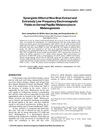Search
for
Sort by
Research
420-450 / 1000+ resultsresearch Hair Growth Promoting Effects of Solubilized Sturgeon Oil and Its Correlation with the Gut Microbiome
Oral sturgeon oil promotes hair growth and improves gut health.
research Hormonal and Genetic Etiology of Male Androgenetic Alopecia
research Human iPS Cell-Derived Cell Aggregates Exhibited Dermal Papilla Cell Properties in In Vitro Three-Dimensional Assemblage Mimicking Hair Follicle Structures
Scientists made structures that look like human hair follicles using stem cells, which could help grow hair without using actual human tissue.

research Osteopontin Gene Is Expressed in the Dermal Papilla of Pelage Follicles in a Hair-Cycle-Dependent Manner
The osteopontin gene is active in a specific part of rat hair follicles during a certain hair growth phase and might affect hair cycle and diseases.

research Isolation of Adipose-Derived Stem Cells Using a Subfractionation Culturing Method
The new method for isolating stem cells from fat is simple and effective, producing cells that grow faster and are better for hair regeneration.

research Hair, Cutaneous Homeostasis, and Stem Cell Functions
Proteins like aPKC and PDGF-AA, substances like adenosine and ATP, and adipose-derived stem cells all play important roles in hair growth and health, and could potentially be used to treat hair loss and skin conditions.
research Regeneration of Dermis: Scarring and Cells Involved
Different fibroblasts play key roles in skin healing and scarring.
research The Chemokine SDF-1/CXCL12 Regulates the Migration of Melanocyte Progenitors in Mouse Hair Follicles
SDF-1/CXCL12 and its receptor CXCR4 are crucial for melanocyte movement in mouse hair follicles.

research Adenosine Stimulates Growth of Dermal Papilla and Lengthens the Anagen Phase by Increasing the Cysteine Level via Fibroblast Growth Factors 2 and 7 in an Organ Culture of Mouse Vibrissae Hair Follicles
Adenosine helps hair grow longer and stronger by boosting certain growth factors and signaling pathways.

research Dermal Papilla Cells and Melanocytes Response to Physiological Oxygen Levels Depends on Their Interactions
Low oxygen levels improve the function of hair and skin cells when they are in direct contact.

research Synergistic Effect of Rice Bran Extract and Extremely Low-Frequency Electromagnetic Fields on Dermal Papilla/Melanocytes in Melanogenesis
Rice bran extract and low-frequency electromagnetic fields together may help treat vitiligo and white hair.
research Proteomics Demonstration That Histone H4 Is a Colchicine-Induced Retro-Modulator of Growth and Alkaline Phosphatase Activity in Hair Follicle Dermal Papilla Culture
Histone H4, released by cells exposed to colchicine, can cause hair loss by inhibiting cell growth and enzyme activity.

research The Effect of Tripeptide-Copper Complex on Human Hair Growth In Vitro
A tripeptide-copper complex may help hair grow by increasing cell growth and decreasing cell death.

research Histological Characteristics of Hair Follicles at Different Hair Cycle and In Vitro Modeling of Hair Follicle-Associated Cells of Yak (Bos Grunniens)
The study provides insights into hair growth mechanisms in yaks.

research Undariopsis Peterseniana Promotes Hair Growth by the Activation of Wnt/β-Catenin and ERK Pathways
Undariopsis peterseniana extract helps hair grow by activating certain cell growth pathways and could be a new treatment for hair loss.

research The Promoting Effect of Ishige Sinicola on Hair Growth
Ishige sinicola, a type of seaweed, may help hair grow by blocking a hair loss-related enzyme and boosting important cell growth.

research Promotion Effect of Norgalanthamine, a Component of Crinum Asiaticum, on Hair Growth
Norgalanthamine from Crinum asiaticum may help hair grow.

research A Comprehensive Review of Biochemical Factors in Herbs and Their Constituent Compounds in Experimental Studies on Alopecia
Herbs might help with hair loss, but more research is needed to confirm their safety and effectiveness.

research Epithelial-Mesenchymal Interaction in Hair Regeneration and Skin Wound Healing
Hair and skin healing involve complex cell interactions controlled by specific molecules and pathways, and hair follicle cells can help repair skin wounds.
research Animal and In Vitro Models for the Study of Hair Follicles
Understanding hair follicles through various models can help develop new treatments for hair disorders.

research Hair-Loss Preventing Effect of Grateloupia Elliptica
Grateloupia elliptica extract may help prevent hair loss and promote hair growth.
research Increased Expression of Zyxin and Its Potential Function in Androgenetic Alopecia
Inhibiting Zyxin may help treat androgenetic alopecia by promoting hair growth.
research Interpretation Of The Yak Skin Single-Cell Transcriptome Landscape
The study mapped yak skin cells to understand hair growth better.
research Hair Growth Potential of Salvia Plebeia Extract and Its Associated Mechanisms
Salvia plebeia extract can stimulate hair growth.

research Scarless Wound Healing: Transitioning from Fetal Research to Regenerative Healing
Understanding how baby skin heals without scars could help develop treatments for adults to heal wounds without leaving scars.

research Identification of an Osteopontin-Derived Peptide That Binds Neuropilin-1 and Activates Vascular Cells
FOL-026 peptide can help repair blood vessels and promote growth, offering potential treatment for vascular diseases.

research Human Skin Stem Cells and the Aging Process
Skin aging is due to impaired stem cell mobilization or fewer responsive stem cells.

research Self-Assembling Peptide Hydrogel Scaffolds Support Stem Cell-Based Hair Follicle Regeneration
Peptide hydrogel scaffolds help grow new hair follicles using stem cells.

research Wound Healing: A Paradigm for Regeneration
Wound healing insights can improve regenerative medicine.